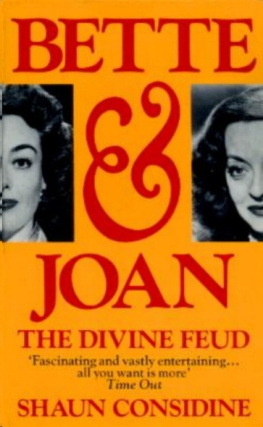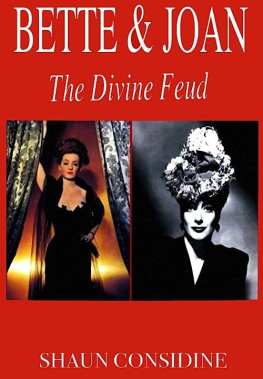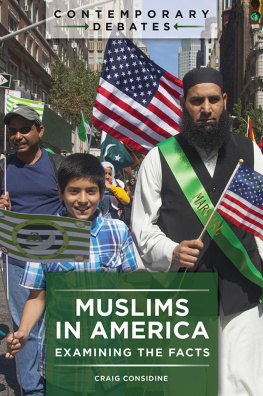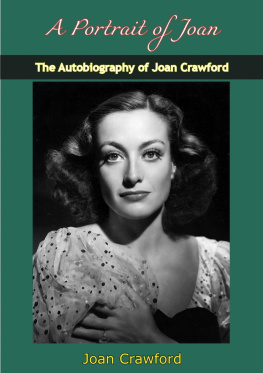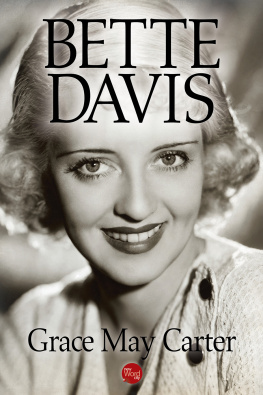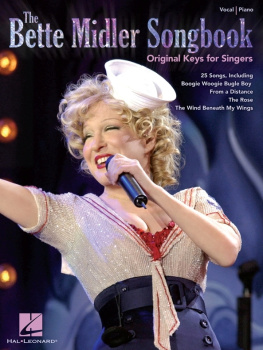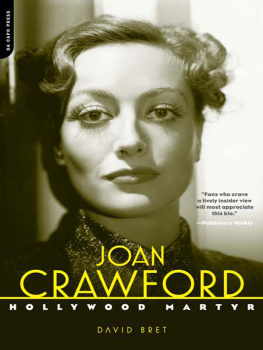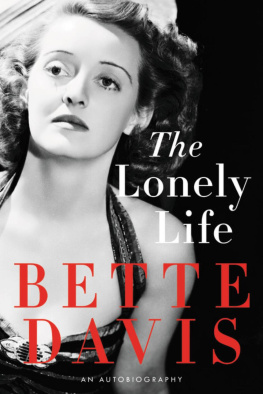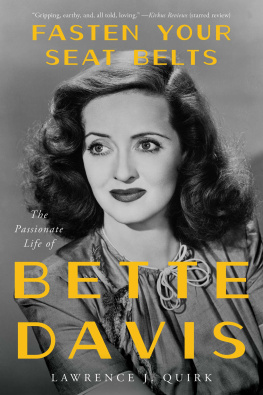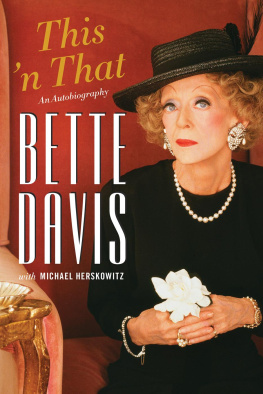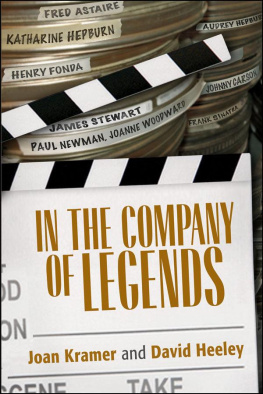Considine - Bette & Joan: The Divine Feud
Here you can read online Considine - Bette & Joan: The Divine Feud full text of the book (entire story) in english for free. Download pdf and epub, get meaning, cover and reviews about this ebook. year: 1990, publisher: Sphere Books Ltd., genre: Non-fiction. Description of the work, (preface) as well as reviews are available. Best literature library LitArk.com created for fans of good reading and offers a wide selection of genres:
Romance novel
Science fiction
Adventure
Detective
Science
History
Home and family
Prose
Art
Politics
Computer
Non-fiction
Religion
Business
Children
Humor
Choose a favorite category and find really read worthwhile books. Enjoy immersion in the world of imagination, feel the emotions of the characters or learn something new for yourself, make an fascinating discovery.
- Book:Bette & Joan: The Divine Feud
- Author:
- Publisher:Sphere Books Ltd.
- Genre:
- Year:1990
- Rating:4 / 5
- Favourites:Add to favourites
- Your mark:
- 80
- 1
- 2
- 3
- 4
- 5
Bette & Joan: The Divine Feud: summary, description and annotation
We offer to read an annotation, description, summary or preface (depends on what the author of the book "Bette & Joan: The Divine Feud" wrote himself). If you haven't found the necessary information about the book — write in the comments, we will try to find it.
Bette & Joan: The Divine Feud — read online for free the complete book (whole text) full work
Below is the text of the book, divided by pages. System saving the place of the last page read, allows you to conveniently read the book "Bette & Joan: The Divine Feud" online for free, without having to search again every time where you left off. Put a bookmark, and you can go to the page where you finished reading at any time.
Font size:
Interval:
Bookmark:
Shaun Considine
Bette & Joan
The Divine Feud
For Bill and Helen Ditford from Sydney, Australia, and for all the Tuohys andConsidines from County Clare, Ireland
On Saturday morning, April 14, 1973, the phone rang in my New York apartment. On the other end of the line was Bette Davis, calling from her home in Connecticut, to talk about a story I was doing on The Catered Affair, one of her favorite films. After discussing the film, I mentioned to Davis, with some apprehension, that I had seen a colleague of hers, Joan Crawford, on stage at Town Hall the previous Saturday night. The news instantly aroused Bette s interest. God! she said, with that inimitable speech pattern. I would have given anything to have been a fly on the wall at that thing. Tell me, how did it go? Crawford was a little nervous at first before a live audience, I said, but she rallied. And? said Bette. She spoke about working with you, I replied. Of course she did, said Bette. And what did Joan say?
Being careful to step around the issue of Bette s explosive temperament (which Crawford dissected), I mentioned that Joan was laudatory, stating that she found working with Davis on Whatever Happened to Baby Jane? to be a challenge.
Whaaat! said Bette, her voice rising in pitch and volume. A challenge? That bitch hated working with me on Jane , and vice versa. She was a pain in the ass before, during, and after the picture was made.
Bette went on to discuss the differences between them. I was the actress and she was the big Movie Star. There is a need for both in this profession, but my dear, at times the woman could be insane ! Joan, according to Bette, was also vain, jealous, and about as stable and trustworthy as a basket of snakes.
The following Monday evening the phone rang once more in my apartment. The caller this time was Joan Crawford, who insisted that she be allowed to give her side of the fractious story. Bette was a liar of course. She was also a bitch and a bully who put her through hell during the making of Whatever Happened to Baby Jane? and tried to destroy her during the production of their second abortive film, Hush Hush, Sweet Charlotte.
A year after my talk with the rival queens, I met Crawford at a New York social function. She was civil, almost cold. She was angry with me, I was told, because I had failed to write about her difficulties with the great beast Bette. But that wasn t my job, my assignment. Furthermore, I wrote nothing because I felt I didn t have the complete facts. One or both of the star ladies was lying about the details given. But certainly I was hooked by the situation. What movie fan wouldn t relish being caught in the crossfire of such living lusty legends? As a journalist, I also felt there was a good story here. For years Davis and Crawford went to considerable lengths to downplay or deny that there was any bad blood between them. Now I knew firsthand that the feud not only existed, it was ready to erupt, bursting into full flame at the mere mention of the other star s name.
The cause of it, however, the why, when and wherefore of their rivalry, which spanned five decades set against the backdrop of Hollywood s most golden era, would take me fourteen years to uncover.
In 1976, the year before she died, I talked with Miss Crawford again, and in 1987, to Bette Davis, specifically for this book. In the interim, extensive research was done; and interviews were conducted with many of the writers, directors, producers, costars, makeup men, hairdressers - the myriad of people who worked with both actresses over the years. Their recall and insights on the lives and long careers, on the radical contrasts and bitter rivalry between two of the most illustrious and durable legends Hollywood ever created, are documented on the following pages.
Bright, ambitious, forceful, impatient, extravagant, self-centered, generous, and stubborn, when one Aries challenges another Aries, they become two battering Rams whose horns are locked.
Carroll Righter, astrologer to the stars.
They were born under the same sign - Aries (the Ram) - and in the same year, 1908, although Davis would later swear, Crawford is five years older than me, if she s a day.
Their backgrounds were also dissimilar, Davis claimed. She came from upper New England stock, while Crawford s roots were vague, inferior, with the possibility that her parents never married.
Bette s parents came from the small town of Lowell, Massachusetts. Her mother, Ruth Favor, resembled a Sargent painting. Her father, Harlow Morrell Davis, was the son of a Baptist minister and a graduate of Harvard s law school. Possessed of a low tolerance for people, pranks and sentimentality, on their wedding day the groom yelled, Damn you! I ll get you for this, after a guest threw rice at the departing couple. On the 4th of July, their wedding night, Bette was conceived, without plan or desire. Post coitus, her father apparently went into an absolute rage when due to a lack of water at the hotel where they were staying, his bride could not douche. Nothing could wash me away, said Bette, born nine months later between a clap of thunder and a streak of lightning. Her birth, a critic later noted, sounded more like an entrance from the wings than the womb.
Joan Crawford s birth by comparison was tranquil, and somewhat soft-focus in recall, as w as the wont of many self-created Hollywood stars of yore. The exact year was said to be 1904, although Crawford preferred 1908, when certificates of birth first went on file in San Antonio, Texas. Her father was Thomas LeSueur. He was French Canadian, a laborer, tall, with dark hair and deep-set eyes, which Joan inherited. Her mother was peasant Irish, and part Scandinavian, with lovely auburn hair and a lack of affection for Joan. She worshipped Daisy, my older sister, she said. When Daisy died, mother transferred her affection to Hal, my older brother. When I was born a year later, she didn t care whether I lived or died. Her father seemed more loving. He held me in his arms when I cried, and soothed my pain with soft touches and whispers, she remembered. When she was ten months old, Thomas LeSueur deserted his family. He ran off with a stripper from a Galveston waterfront bar, said Bette Davis in her memoirs. A second man soon replaced him - Daddy Cassin. He adored Lucille, as she was called then, and she believed for the longest time he was her true father. When she was eleven, he too deserted the family. Being abandoned so often traumatized Joan, said writer Adela Rogers St. Johns. She spent the rest of her life looking for a father - in husbands, lovers, studio executives, and directors. When she found the ideal candidate, Joan felt safe, secure, validated. In time she expected them to leave, to reject her. When they didn t, she grew suspicious, then resentful, and found ways to make them depart.
Why waste time hating your father, when he had a father who had a father before him? asked the more pragmatic Bette.
Describing herself as an amiable child, wreathed in smiles, Bette s first word was papa. Her father s affection was minimal, however. He despised babies, small children, displays of affection and small talk with anyone. said Bette. A constant smoker and an intellectual snob, he also bequeathed to her his brains and aptitude for self-preoccupation. When she was eighteen months old, her sister, Barbara, was born. Enamored at first, Bette soon asserted her position over the younger child. Finding the baby asleep in her crib, Bette lifted her out and dumped her face down on the nearby sofa. I like Dolly but I don t want Dolly here, Bette explained. Jealous of her sister s abundant curls, Bette would later give the infant a haircut, leaving her head cut in scallops.
Next pageFont size:
Interval:
Bookmark:
Similar books «Bette & Joan: The Divine Feud»
Look at similar books to Bette & Joan: The Divine Feud. We have selected literature similar in name and meaning in the hope of providing readers with more options to find new, interesting, not yet read works.
Discussion, reviews of the book Bette & Joan: The Divine Feud and just readers' own opinions. Leave your comments, write what you think about the work, its meaning or the main characters. Specify what exactly you liked and what you didn't like, and why you think so.

